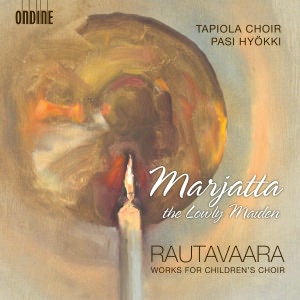In the grand history of choral music, writing specifically for children’s choir is something top-rank composers have taken to only relatively recently. Benjamin Britten was among the first to treat the children’s choir not as a novelty or an adjunct to an adult choir but as its own legitimate genre; Zoltán Kodály was another. And the eminent Finnish composer Einojuhani Rautavaara not only regards the genre as worthy of serious attention, but honors it with a level of sophistication and complexity equal to any other.
Which is to say, just because this is a program of “kids” singing, don’t get the idea that it’s going to be easy listening. The innocent voices you may be expecting are here dealing with such subjects as devils dancing, death and the end of the world, love, a foreshadowing of Christ’s crucifixion, and the “powerful, blood-saturated and death-embracing poetry of Federico Garcia Lorca.” Yet we also hear a lovely presentation of Rautavaara’s setting of the uniquely Finnish version of the Christmas story, a mystery play based on an account from the Finnish national epic, the Kalevala. This immediately engaging work, Marjatta matala neiti (Marjatta the Lowly Maiden), has been recorded before by this same choir, under its founding director, Erkki Pohjola (click here for review), who also was the motivating force for Rautavaara’s reworking of the Lorca pieces from their original mixed choir version to one for children’s voices.
Yes, this is challenging music (see the sound clip below, an excerpt from the first of the Lorca pieces), but it’s undeniably honest in its explication of texts and in its expectations of the singers. It’s easy for adult singers to express the biblical sentiment “When I was a child, I used to talk like a child…”; but when a choir of children sings that same text, it’s cast in an entirely different light. And what of the nursery rhyme “What are little boys made of…”? Of course, girls know best on that issue, and Rautavaara lets them have their say in this 63-second reminder of “frogs and snails” versus “sugar and spice”. Wherever your sentiments lie on that issue, there’s no denying the freshness and vitality—and sheer virtuosity—of the Tapiola Choir, whose founding principles and continued standards of musicianship and technical accomplishment place it among the world’s top vocal ensembles, one for whom any composer would be inspired to write.
































